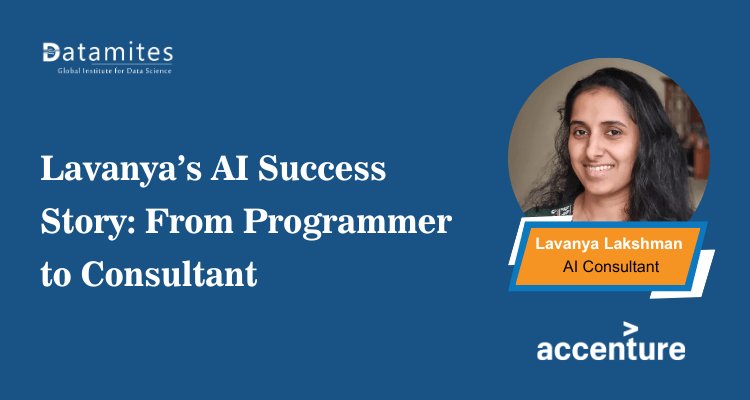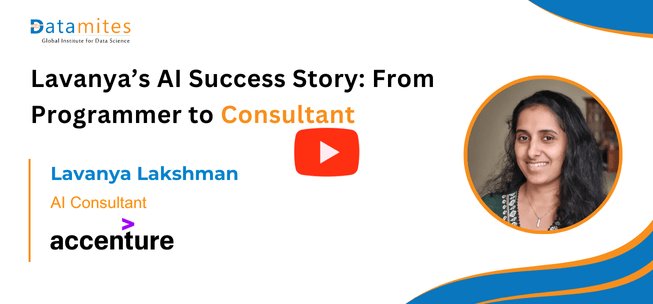Lavanya’s AI Success Story: From Programmer to Consultant
Discover Lavanya’s inspiring AI success story—her journey from programmer to AI consultant, overcoming challenges and mastering AI-driven decision-making with expert guidance.

Artificial Intelligence (AI) and Data Science are among the fastest-growing fields in the tech industry today. Many professionals aspire to make a career switch, but navigating this transition can be daunting without the right guidance. In an exclusive session at DataMites, Lavanya shared her journey of evolving from a programming professional in TCS to an AI Consultant at Accenture. Her story is not only inspiring but also a roadmap for aspiring data science professionals.
Exclusive Q&A: Lavanya’s AI Success Story with DataMites
In this exclusive Q&A, Lavanya shares her journey from a programming professional to a full-stack AI consultant at Accenture. She discusses the challenges she faced, the skills that helped her succeed, and the lessons learned along the way. Her insights provide practical guidance and inspiration for aspiring data scientists, AI engineers, and professionals looking to leverage AI for smarter decision-making.
1. Can you briefly introduce yourself and your career journey?
I have over 10 years of experience in IT, initially focusing on SQL programming and forms development. While my early experience wasn’t aligned with data science, I always had a strong interest in programming. Eventually, I transitioned into machine learning and artificial intelligence through courses at DataMites, which completely transformed my career.
2. Why did you choose DataMites for your Artificial Intelligence/Data Science learning?
I wanted classroom-based learning for better understanding, especially as the concepts were new to me. DataMites had good reviews and proximity to my location, and their teaching methodology was beginner-friendly yet robust for experienced professionals.
3. How did your learning at DataMites help you professionally?
The course projects and hands-on learning helped me build a solid profile. I could participate in hackathons and explore additional projects, which were crucial during interviews and practical applications in my subsequent roles.
4. What kind of projects did you work on during your course?
I worked on sector-specific projects like credit card fraud detection in banking and churn rate analysis in telecom. These projects taught me classification techniques, data manipulation, and model building.
5. How important are projects for switching careers in artificial intelligence?
Projects are essential. They provide practical experience, demonstrate your skills to employers, and prepare you for scenario-based questions in interviews.
6. Did you face any challenges during the learning process?
Initially, statistics was challenging. Understanding concepts from scratch required extra effort, but additional resources like Joshua Stamma’s tutorials and K’s Academy helped a lot.
7. What was your study pattern while managing a full-time job?
I relied heavily on classroom notes, recorded sessions, and self-practice. I often listened to recorded lectures while commuting, revisited concepts, and participated in hackathons for hands-on experience.
8. How did your career transition happen after completing the course?
I first applied my learning within TCS in their Innovation and Research Lab, working on Python, ML, and data science projects. Later, I transitioned to Accenture, where I am fully engaged in AI, NLP, and data engineering projects.
9. Can you describe your role at Accenture?
I work on a full-stack AI role involving data engineering, ML engineering, and NLP model development. My focus is on workforce planning solutions for corporate clients using AWS, DataBricks, and SageMaker Studio.
10. What tools and programming languages do you use daily?
Mainly Python for coding, AWS for cloud solutions, DataBricks, and SageMaker Studio for model deployment and experimentation.
11. How do you stay updated in the fast-evolving artificial intelligence field?
I follow platforms like Edureka and Analytics Vidhya for beginner-friendly tutorials and updates on new AI/ML models. Continuous learning is critical as the field evolves rapidly.
12. What are some key skills for an aspiring data scientist or Machine Learning engineer?
Apart from programming and SQL, logical thinking is vital. Understanding patterns in data, problem-solving, and applying ML models practically are crucial skills.
13. How did you prepare for interviews after completing the course?
Focus on confidence and mastery of your projects. Be prepared for scenario-based questions and steer the discussion toward areas you are strong in. Avoid overloading your resume with unfamiliar keywords.
14. Any advice for tackling interview questions effectively?
Be well-versed with your projects, including data handling, manipulation, and problem-solving. Even simple classification problems can be explored in depth during interviews.
15. What resources helped you learn beyond the classroom?
Hackathons, additional projects, research publications, and online tutorials were extremely helpful in building expertise beyond the course curriculum.
16. How did your DataMites learning experience influence your career growth?
It was a turning point. From a SQL programmer, I became a full-stack AI consultant, exploring AI, ML, NLP, and data engineering. The course not only enhanced technical skills but also provided exposure to industry-relevant projects.
17. Any final advice for aspiring artificial intelligence professionals?
Keep learning, stay curious, and actively engage in projects and hackathons. Consistent practice, logical thinking, and confidence can significantly accelerate your career in artificial intelligence.
Refer to these articles:
- From Fresher to AI Engineer – Darshan’s Success Story
- Junaid’s Path to MLOps Excellence: Data Meets Deployment
- From Learner to Leader: Chandan’s Inspiring Journey as an AI Lead
Key Findings from Lavanya’s artificial intelligence Career Journey
Discover how Lavanya transitioned from a programming professional to a full-stack AI consultant and gained expertise in AI-driven decision-making with the guidance of DataMites.
- Career Transition is Possible: Professionals with prior IT experience can successfully switch to AI/Data Science with structured learning and practical exposure.
- Importance of Classroom Learning: In-person courses like DataMites help beginners understand new concepts effectively through guided teaching and peer interaction.
- Hands-On Projects are Crucial: Real-world projects in banking, telecom, and retail help build practical skills and prepare for interviews.
- Continuous Self-Learning Matters: Participation in hackathons, research publications, and online tutorials enhances learning beyond the classroom.
- Overcoming Challenges: Core topics like statistics can be challenging initially, but consistent practice and additional resources can help overcome them.
- Study and Revision Techniques: Combining classroom notes, recorded sessions, and on-the-go revision (like during commuting) ensures better retention.
- Internally Applying Skills: Applying new skills within the current organization can serve as a stepping stone before switching to a new company.
- Full-Stack AI Exposure: A combination of data engineering, ML engineering, and NLP provides a comprehensive understanding of AI projects.
- Essential Tools and Technologies: Python, AWS, DataBricks, and SageMaker Studio are key tools for practical AI and ML implementation.
- Staying Updated: Following platforms like Edureka and Analytics Vidhya helps stay current with evolving AI technologies and models.
- Interview Preparation: Confidence, mastery of projects, and logical thinking are more important than simply memorizing keywords for resumes or interviews.
- Logical Thinking is Vital: The ability to identify patterns, solve practical problems, and apply models effectively is a critical skill for AI professionals.
- Career Growth Through Learning: Structured learning, continuous practice, and industry exposure can lead to significant career advancement in AI.
- Networking and Peer Learning: Classroom environments help build professional contacts, which can be valuable throughout a career.
- Persistence and Curiosity: Regular practice, staying updated, and being curious about new tools and models are key factors for long-term success in AI.
Refer to these articles:
- Is There Still a High Demand for Artificial Intelligence in Pune?
- Artificial Intelligence Course Fee in Bangalore
- How to Become Machine Learning Engineer in Mumbai?
Lavanya’s journey is a powerful example of how structured learning, hands-on projects, and unwavering persistence can transform a career. Her experience offers actionable insights for both professionals seeking to transition into AI and students aspiring to enter the field of data science. With the global Artificial Intelligence (AI) market valued at USD 538.13 billion in 2023 and projected to grow at a CAGR of 19% to nearly USD 2,575.16 billion by 2032, according to Precedence Research, the opportunities in this field are immense, and stories like Lavanya’s highlight the path to tapping into this growth.
DataMites offers a comprehensive artificial intelligence course in Bangalore designed for both beginners and working professionals. Catering to learners in areas like Kudlu Gate, BTM Layout, Marathahalli, and surrounding regions, the institute provides flexible training schedules, expert mentorship, and dedicated placement support, making it easier to start or advance a career in AI.
Artificial Intelligence is revolutionizing industries, and Pune is emerging as a key hub for this innovation. Whether you are a student eager to explore AI, a tech enthusiast, or a working professional looking to upskill, now is the perfect time to enter the AI domain. Choosing the right artificial intelligence courses in Pune can open up rewarding career opportunities and provide you with the practical knowledge, tools, and guidance needed to thrive in today’s data-driven world.

